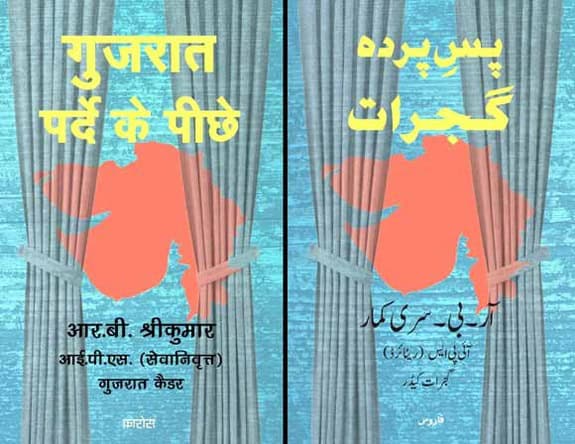Gujarat: Behind the Curtain written by former Gujarat state Director-General of Police RB Sreekumar exposes how in order to enable the 2002 Gujarat riots the law was subverted, twisted and relinquished in service of political masters by the very men who are supposed to uphold its sanctity. When he saw that the riots were deliberate and planned and the entire government missionary is being used against a particular community he then raised voice against it. He began the movement to expose the conspiracy of riots and challenged the then chief minister Narendra Modi. However, he had to face the consequences. He was transferred. But he didn’t stop.
Sreekumar penned down the book in English whose Urdu translation ‘Pas-e-parda Gujarat’ is translated by Syed Mansoor Agha and published by Delhi publisher, Pharos Media. It was launched in January 2018.
In the book, the author observed that the riots were planned and government missionary was illegally and unconstitutionally used to save the rioters. The book is divided into 13 chapters.
Mentioning SIT constituted by the Supreme Court and Congress in the foreword, he stated SIT worked like B team of Gujarat police and gave a clean chit to all that were made accused on the basis of the complaint lodged by Zakia Jafri.
Sreekumar criticised Congress-led UPA government for its indifference towards the Gujarat riot victims once it came to power in 2004. He says UPA government and Congress could not come up anywhere near the lowest levels of hope and expectations on them, by riot victim survivors and human right activists since 2004. In the first chapter of the book Sreekumar narrated how houses of Hindus were marked with Om or Swastik mark to be identified by the rioters of Sangh Parivar; so that they could target Muslims and their properties.
In the 2nd chapter Sreekumar explains Godhra train tragedy and riots in details. With reference to DGP Chakravarti, he writes that on February 27 the then chief minister Narendra Modi called a meeting of the high officials at his residence in which he said generally police mete out equal treatment to Hindus and Muslims during communal riots but this will continue no more. Hindus will be given an opportunity to express their anger.
Sreekumar has made some startling observation in the book. One of them is the complicity of members of the victim community against their own people. He writes remarkably three senior IPS officers with clear motive and without any vengeance (ADGP RB Sreekumar, Superintendents of Police Rahul Sharma and Sanjiv Bhatt) had submitted in-depth data exposing the complicity of State Government and many officials in 2002 Gujarat riots. However, 6 IAS and 7 IPS officers from the Muslim community in Gujarat remained silent about the authors of mass crimes.
He has very emotionally mentioned Naroda Patiya massacre thus, ‘On February 28, 2002, when I was in office, Khurshid Ahmed (IPS, 1997 batch) Commandant of SRPF, Headquartered at Saijpur Boga near Naroda Patiya, where 96 persons were killed by evening of that day, informed me by phone that about 500 Muslim families threatened by attacking mobs were seeking asylum inside the camp, secured by compound wall and armed sentries. He wanted specific orders for letting these private persons inside the SRPF Battalion Headquarters. In response, I immediately sent a fax message directing the Commandant to accommodate those seeking protection in the vacant barracks emptied by men, who were deputed to disturbed areas. In fact, the Commandant and his second-in-command DySP (deputy superintendent of police) Qureshi were in (a state of) panic (both belong to Muslim community) about the risk of their permitting Muslims, facing imminent danger, inside the campus. I assured them that none would find fault with them as they were complying with my written orders.
The State Government later claimed that 500 Muslims were saved by permitting them to stay in SRPF campus. Afterwards, I came to know that the Commandant had refused, ignoring my written orders, entry of refuge seekers in empty SRPF barracks and consequently, they had become victims of riots at the hands of marauding brigands. Most of the 96 people killed in the evening in Naroda Patiya were reportedly from this group of Muslims who were denied asylum in SRPF campus. No action was initiated for defying written order of ADGP (AU) and no report was made. Reportedly, senior leaders pressurized Commandant for not permitting Muslims under attack by rioters inside SRPF campus. The State Government had subsequently posted Commandant Khurshid Ahmed in a sought after post of Deputy Commissioner of Surat city and his wife Shamina Husain (IAS, 1997 batch) as District Development Officer (DDO), Valsad district and Collector, Surendranagar district. DySP Qureshi was awarded President’s Police Medal for distinguished service, which is rarely awarded to SRPF officers, having no experience in crime policing.
Sreekumar had submitted 9 affidavits (4 while in service and 5 after retirement) to the enquiry commission formed to look into Godhra and the riots that followed. The aftermath of Gujarat riots saw innumerable instances of non-Muslim police officers and socials activists standing up for the minority community and paying a heavy price for their uprightness.
Behind the Curtain is a compelling narration of violation of law and constitution of India in the Gujarat of 2002 and the subsequent mockery of justice to riot victims in the years that followed. Sixteen years that followed the 2002 carnage have witnessed and continue to witness events that have irrevocably altered the course of this nation.

